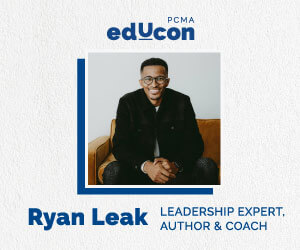
“I’ve learned that … the more that I share my setbacks, people actually gravitate toward it more,” said leadership expert Ryan Leak, who will speak at 9 a.m. Monday at PCMA EduCon. (Courtesy The Ryan Leak Group)
When author Ryan Leak takes the Main Stage at PCMA EduCon at 9 a.m. this morning, he’ll share how one of his greatest failures turned into a spectacular success story.
The story is about his attempt to join the NBA as a player. His lifelong dream didn’t come true, but sparked his USA Today’s best-selling book and the documentary Chasing Failure: How Falling Short Sets You Up for Success and set in motion Leak’s career as leadership expert, coach, and motivational speaker. He now gives talks around the country about how to see failures as nothing to be ashamed of, but opportunities to learn and grow instead.
“There are always going to be flaws in something, and I know we want this flawless experience,” he continued, “and on some level we have to silence the inner critic. I think what our clients have to know [is that] we’re doing our best. And sometimes people make mistakes. … People think, ‘Oh, I have to protect my image and nobody can see me flawed.’ But I’ve learned that the more that I share my failures, the more that I share my setbacks, people actually gravitate toward it more.”
Leak shared a glimpse into what EduCon participants can expect from his Main Stage session. Here’s an excerpt of our conversation.
How did the pandemic influence the writing of your fifth edition of the book and your philosophy in general?
It was the most honest [thing] I’ve ever written. There was a chapter on procrastination — that’s something that holds people back from trying new things. And I was writing a chapter on procrastination, and I was procrastinating — so I just decided to write about everything else that I did that morning instead of working on the book.
Part of the turn that I’ve made as a communicator is I realize that there has been this merging of our personal and professional life. I would say pre-pandemic, it was, “Let’s just keep things professional. This is business. We don’t talk personal.” Except we’re in each other’s homes right now, and my kids could come busting through the door any minute. And so there is this new humanity, this humanness element. There’s more grace than ever before.
I’ve been using this line that has just resonated with so many people — “You don’t want to be winning at work and losing at home.” I would argue if you’re losing at home and winning at work, you’re just losing. People want to talk about, “Hey, I really want to be really good at my job, but I’m freaking tired. I am running on fumes, and I can’t do my job well unless I can say that out loud. And I’m not sure if I have permission to do so.”
So if I’m given an hour to speak, I want to give people an hour to breathe, to say, “Actually, hey, you can be off. You can loosen your tie. You can let your hair down.” I’ve given people that permission. I’m there to encourage the room.
You say that we are in a period of grace. Do you think that frees people up to feel like they can make mistakes and move on?
I don’t know. One of the points of my talk is about creating failure-friendly environments, and how failure-friendly environments first require failure-friendly people. It’s easy to take shots at a big company, but it really doesn’t make sense because we all tell the stories of our organizations, one employee experience at a time. So if you get a very kind email, you might say, “Man, people here are really nice.” No, you actually got one email.
But that’s how people tell stories. And so I encourage people to play their part in that, in saying, “Hey, just be a failure-friendly person.” You can’t control if the whole organization is going to give you that space and grace. But you can control how you respond to somebody’s shortcomings, somebody’s mistakes, or dropping a ball in some way, shape, or form.
I would say it varies industry to industry. Some industries have a little bit more grace and space to fail than others. Lawyers don’t have as much space to fail — that could mean jail time. A heart surgeon, not much room for failure, but I would say in most of our industries, there’s some space for that.
The challenge is that when event organizers fail it’s in a public way and in real time. What’s your advice on that?
I’d say own it. Own it. It took me 20 virtual events to get to where I am now. I spoke for Thrivent Financial — I had one online event at 6 p.m. and another for them at 7 p.m., back to back. I ended one event at 6:58, and in the process of logging in to the next, my audio jack slipped out just a little bit. I spoke for 50 minutes on mute. In the setup I had at the time, my slides were full screen so I couldn’t see the Zoom anymore or the chat, and my phone was on “Do not disturb.” I share that story all the time: “I was talking to one of the largest organizations in the world, and guess what? I was on mute.”
And the wonderful thing is Thrivent had me back for two more events, just a couple of weeks ago. But you know what? What it has done is it has over-prepared me. Now when I show up for virtual, I’ve got seven batteries sitting out. I’ve taken notes on what went wrong. And still, nevertheless, I was speaking the other day in the sunlight when I had started the virtual, was in one spot, but over the course of an hour, it moved and started blinding the camera. So I had to figure out a way to get from this side of the room to that side of the room to smoothly close the blind without it being a disruption. My kids burst through during it. And you know what? You just own it.
What’s your personal philosophy of leadership?
You have to lead yourself before you can ever lead other people and you actually can’t control whether or not you have a good leader — it’s completely out of your control. Ninety percent of team members and employees say they have an average to bad leader. Some people would even use the word “toxic.”
In fact, if you hear somebody say, “I work for a great leader,” you go, “You do?” It’s an exception to the rule. So if most of us are stuck with average to mediocre leaders, does that mean that we’re all doomed to mediocre to average destinations? I don’t think it’s true that your growth hinges on who is leading you. I think your growth hinges on how you are leading yourself.
Michelle Russell is editor in chief of Convene.
Leadership expert, author, and coach Ryan Leak is a featured speaker at 9 a.m. Cy June 6 at PCMA EduCon 2022 at the Hyatt Regency New Orleans. Learn more at pcmaeducon.org.

